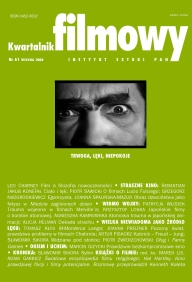Całe miasto o tym mówi. Konteksty kryminału za trzy grosze
The Whole Town Talks about It: the Context of a Three Penny Detective Story
Author(s): Tomasz KłysSubject(s): Theatre, Dance, Performing Arts
Published by: Instytut Sztuki Polskiej Akademii Nauk
Keywords: Lang Fritz; serial killer; Weimar Republic;
Summary/Abstract: The praise that Fritz Lang film, “M” (1931) received from Joseph Goebbels, adds a certain ambivalence, to the meaning of this famous work. “M” was identified as a “topical film”, dealing with the widely publicized case of a serial murderer, Peter Kürten, who terrorized Düsseldorf, between February 1929 and August 1930. However the character portrayed in the film is not Kürten. The murderer in the film displays some important differences from the “Vampire of Dusseldorf” and reminds the viewer of some other serial killers of the Weimar period, namely Grossmann, Denke, and Haarmann. The film is a reflection of Weimar periods obsession with serial killers and sexually motivated murder (Lustmord), which is also present in a multitude of literary texts, plays, painting and films. Lang’s film is an in-depth analysis of how media operate in the modern society by a) creating mass psychosis, culminating in the death or capture of a scapegoat victim, b) create “reflected ego” of the serial killer and his followers; c) allow classification, comparison and fast flow of information, that in the hands of the state become means of control. The M in the title does not refer only to murder but also to man, as violence appears to be a natural and almost unavoidable characteristic of human beings. Violence can serve as a coalescing agent for society, for example through the sacrifice of a scapegoat victim, as it happens to Beckert in the film.
Journal: Kwartalnik Filmowy
- Issue Year: 2008
- Issue No: 61
- Page Range: 138-154
- Page Count: 17
- Language: Polish

